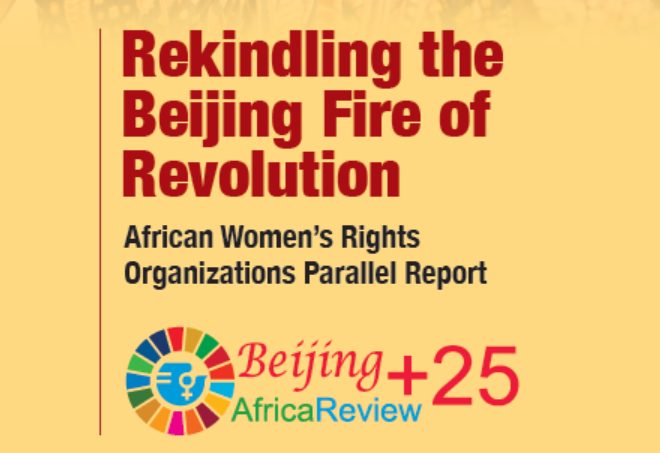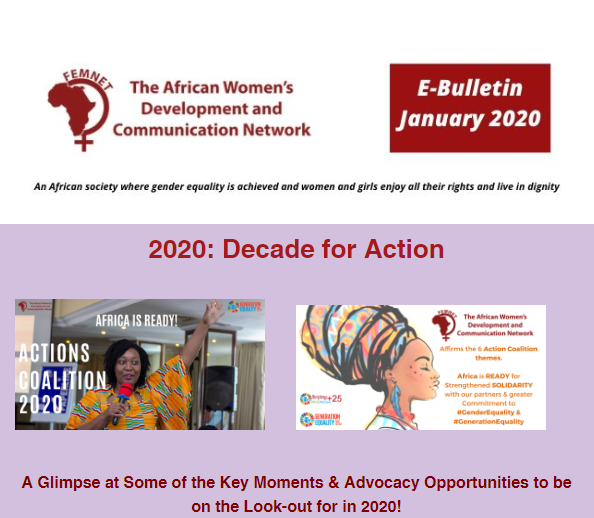Third Regional Conference for African Women in Political Leadership.
A major priority for both the African Women’s Decade (2010‐2020) and of the new super-agency for women’s empowerment ‐ UN Women ‐ is increasing women’s political participation and leadership. This is no coincidence both at the regional and international levels where there is renewed emphasis on enhancing women’s participation in decision making as a pre‐requisite for women’s empowerment and realizing genuine democracy on the continent.
According to 2011 data from the Inter‐Parliamentary Union, women currently occupy 19.4% of parliamentary seats in Sub‐Saharan Africa, which is slightly higher than the world average of 19.3%. Rwanda leads the way with 56.3% in its lower house, while South Africa is at (44.5%), Mozambique (39.2%), Angola (38.6%), Uganda (37.2%), Tanzania (36%) and Burundi (32.1%) which all exceed the 30% threshold set in the Beijing Platform for Action (BPfA) adopted at the 1995 Fourth World Conference on Women.
In the period 2011‐2012, at least twenty African countries are scheduled to hold elections. Thus far, Uganda, Cape Verde, Chad, Niger, Benin, Central African Republic, Nigeria and Djibouti have held their elections, albeit with irregularities in some cases and an overall reduction in the percentage of women in political leadership from the previous year.
In Uganda there was one female presidential candidate, who ultimately received less than 1% of the total vote. Following the election, the country saw an increase of about 6% in women’s representation in parliament, and Hon. Rebecca Kadaga was elected as the first female Speaker of the Ugandan Parliament.
Both Cape Verde and Central African Republic increased the number of women parliamentarians by about 3%, and now have about 21% and 10% women in parliament respectively. Chad experienced a significant jump since its last elections in 2002, and currently 14% of parliamentarians are women, up from 5%. Niger was finally able to hold elections after several postponements since the coup in 2010. The country now has 13% women in parliament, up from about 10% before the coup. Benin registered almost a 3% decline in the proportion of women parliamentarians, and now stands at 8.4%. It is Nigeria, however, that saw the most dramatic regression in its recent elections, cutting the proportion of women in both the upper and lower houses by half. Nigeria is now near the bottom of the table internationally with less than 4% parliamentarians being women.
Since December 2009, Sub‐Saharan Africa in general has seen an increase in women’s participation in parliament, from 18.7% to the current 19.4%. This is cause for celebration considering the challenges women experience in penetrating the spheres of political leadership, the continued patriarchal opposition to women’s leadership from various quarters, and the increasingly hostile environment for civil society organizing witnessed in several countries. Conversely, the marginal increase at regional level belies the fact that established democracies like Namibia and Botswana have experienced almost 3% declines in women’s participation in their most recent elections. Other major democracies like Kenya and Zambia are also holding elections in the coming months. What can we expect from them and how can we avoid further losses in terms of numbers?
No country except Rwanda has achieved gender parity, which is the African Union standard, in their respective parliaments. This is ultimately the goal, and is supported by various regional and international human rights instruments to which most African governments are party. The same governments have now committed themselves to accelerating the realization of women’s equal participation in public and private life over the course of the African Women’s Decade, therefore it is imperative to strategize on how to capitalize on this political will and provide the necessary support mechanisms and structures to increase women’s participation and capacity to do so.
In the recent past there have been attempts to assess the extent to which increased women’s representation in democratic institutions is contributing to changing the cultures of these institutions and the way they conduct their business. Such studies have been undertaken in Uganda and South Africa. The findings reflect a mixed experience, and questions of sustainability of the changes are constantly raised. It is against this backdrop that the Third Regional Conference on African Women in Political leadership organized by FEMNET annually will devote time to explore some of the best practices and attempts that have been made to make these institutions more gender sensitive in their rules and procedures and the way the agenda is generated and implemented.
The Conference will take place in Nairobi, Kenya from 29th – 31st August, 2011 at Sarova Panafric Hotel. The purpose of the Conference will be threefold:
1.Conceptualizing a Funding Framework for Women in Politics and Governance: To delve deeper discussion on how to set up such a Fund, including mechanisms for accessing the fund, eligibility and its location.
2.Deliberate on Support Mechanisms for Women in Politics at National, Regional and International Levels: To allow participants to strategically identify the successes and gaps of existing initiatives, as well as the value addition that a new network could provide.
3.Share best practices and attempts made to influence the culture and agenda setting practices in institutions of democracy like parliaments and local councils in Africa. This will enable participants to appreciate some of the hurdles women in politics face and strategize together on how best to overcome them.
In addition the participants will continue to reflect on issues of balancing their private and public lives, self care, minimizing burn‐out and failure to sustain a decent way of life beyond the time in active politics. The Conference will provide space for participants to learn from each others’ experiences, and provide skill‐building information and practical exercises in this area.
The conference will bring together seasoned women politicians as well as political aspirants from the countries holding elections in 2011‐2012, leading women’s rights activists, civil society and research organizations engaged in women’s leadership development, and key development partners who support women’s political participation initiatives. Special efforts will be made to ensure participation of young women political leaders and aspirants. The countries to be represented at the Conference include: Kenya, Zambia, Liberia, Nigeria, Senegal, Southern Sudan, Egypt, Cameroon, Uganda, Zimbabwe, Democratic Republic of Congo, Rwanda , Tanzania, Sierra Leone and Tunisia.
Related Posts
Rekindling the Beijing Fire of Revolution: Africa Beijing+25 Parallel Report
The Beijing+25 Africa Regional Civil Society Organisations (CSOs) parallel report provides an independent analysis of the last five years review and appraisal
Learn More2020: Decade for Action – FEMNET January 2020 E-Bulletin
A Glimpse at Some of the Key Moments & Advocacy Opportunities to be on the Look-out for in
Learn More







